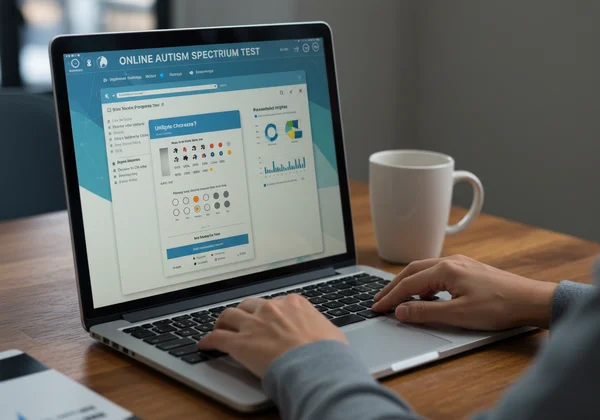Adult Autism Signs: Online Autism Spectrum Test for Subtle Traits & Female ASD
Have you ever felt like you're operating on a different wavelength from everyone else? Perhaps you struggle with unspoken social rules, feel drained by interactions others find easy, or have intense sensitivities that seem unique to you. If these feelings resonate, you might be asking yourself a profound question: How do I know if I am autistic? This guide is for you. We will delve into the often-missed adult autism signs, exploring how experiences like masking autism can obscure these traits, particularly in women.
Understanding the nuances of Autism Spectrum Disorder (ASD) in adulthood is the first step toward clarity and self-acceptance. Your unique experiences are valid, and exploring them can be an empowering journey. If you're ready to see if your traits align with the spectrum, a great starting point is a confidential online autism test designed to provide initial insights.

Understanding Autism in Adults: Beyond Stereotypes
When many people think of autism, they picture stereotypes often seen in media, which rarely reflect the reality for countless adults. Autism in adulthood presents very differently from how it might in childhood, shaped by years of life experience, learning, and adaptation. It's not about a specific "look" or behavior but a fundamental difference in processing the world.
How Adult Autism Signs Differ from Childhood Presentations
While the core characteristics of autism remain consistent, their expression evolves. A child might have very obvious repetitive behaviors or clear social difficulties. An adult, however, may have learned to suppress these outward signs. For instance, childhood meltdowns might transform into internal shutdowns or burnout in adulthood. The directness that seemed "rude" in youth may have been polished into a carefully curated professional communication style. The journey of an undiagnosed autistic adult is often one of developing complex coping mechanisms that can make their underlying traits much harder to spot.
Key Social, Communication, and Behavioral Characteristics
The signs of autism in adults typically fall into several key areas. Many autistic adults find that they:
-
Experience Social Challenges: This isn't an inability to be social, but a different way of doing it. You might find small talk confusing and exhausting, prefer deep conversations on specific topics, or misread non-verbal cues. After socializing, you may need significant time alone to recover your energy.
-
Have a Different Communication Style: You may be very direct and literal in your speech, which can be misinterpreted as blunt. Alternatively, you might have a vast vocabulary and speak in a formal or "professorial" manner. Info-dumping, or sharing a wealth of information about a passionate interest, is also a common trait.
-
Engage in Repetitive Behaviors and Routines: This is often a way to self-regulate in a chaotic world. It can include "stimming" (self-stimulatory behavior), which might be subtle in adults—like tapping your fingers, fiddling with an object, or pacing. A deep need for routine and predictability is also common, with changes causing significant distress.
-
Hold Intense, Specialized Interests: Often called "special interests," these are passions that you dive into deeply, becoming an expert. These interests are a source of immense joy, comfort, and expertise.
-
Have Sensory Sensitivities: You may be over- or under-sensitive to sounds, lights, textures, smells, or tastes. A noisy office might feel physically painful, or you may not notice a temperature change that others find extreme.

The Phenomenon of Masking Autism in Adulthood
Many adults, especially those undiagnosed for years, become masters of camouflage through a process known as masking. This is a primary reason why so many individuals question their own experiences for decades before considering autism.
What is Masking and Why Do Autistic Adults Do It?
Masking, or camouflaging, is the conscious or subconscious suppression of natural autistic traits to appear "neurotypical." It's a survival strategy learned over a lifetime of trying to fit in, avoid bullying, or meet professional and social expectations. An autistic person might force eye contact even if it's uncomfortable, mimic the social behaviors of others, or rehearse conversations beforehand. While effective for navigating a neurotypical world, this constant performance is mentally and emotionally exhausting and can lead to burnout, anxiety, and a lost sense of self.
Common Indicators of Autistic Masking in Daily Life
Do you feel like you're putting on a performance in social situations? That could be masking. Some common signs include feeling completely drained after work or social events, needing extensive alone time to "recharge," or feeling like no one knows the "real" you. You might have a "public" persona that is cheerful and outgoing, which contrasts sharply with your private self. Recognizing these patterns is a key part of understanding your neurotype and finding a more authentic way to live.

Recognising Female Autism: Overlooked & Undiagnosed
For decades, autism research and its diagnostic criteria were based almost exclusively on studies of boys and men. This has led to generations of autistic women and girls being overlooked, misdiagnosed, or dismissed. The presentation of female autism is often more subtle and internalized.
Why Autism is Often Missed in Women and Girls
Societal expectations often pressure girls to be more socially adept and less disruptive than boys. From a young age, many autistic girls become highly skilled at masking to meet these expectations. Their intense interests might also be in more socially "acceptable" topics like literature, psychology, or animals, making them seem less unusual. As a result, their internal struggles are often mislabeled as shyness, anxiety, or even personality disorders.
Subtle Traits & Internalised Experiences in Autistic Women
Autistic women often describe a rich and intense inner world that contrasts with a quiet or reserved exterior. Friendships may be few but are incredibly deep and loyal. They often have a strong sense of justice and powerful, sometimes overwhelming, empathy. Instead of explosive meltdowns, they may experience internal shutdowns, where they feel numb or completely withdrawn. Recognizing these more subtle expressions is vital for self-discovery and can be validated through a supportive autism spectrum test for adults.
Taking the Next Step: Is an Autism Spectrum Test for Adults Right for You?
If you've read this far and see your own life reflected in these descriptions, you may be wondering what to do next. The journey toward understanding whether you are on the autism spectrum is personal, and a great first step can be an accessible screening tool. You can explore this further at autismspectrumtest.org.
When to Consider an Online Autism Screening
Considering an online autism screening is a positive step if you are seeking clarity. It's for anyone who wants to better understand their own social, communicative, and sensory experiences. This initial screening can provide you with valuable data points, helping you organize your thoughts and decide whether to pursue a formal diagnosis. It’s a private, low-pressure way to explore the possibility of being autistic.
What Insights Can a Free Online Test Provide?
A scientifically-based free autism test serves as a preliminary screening tool. It is not a formal diagnosis. However, it can offer powerful initial insights by comparing your responses to patterns commonly associated with Autism Spectrum Disorder. On our platform, our tests are based on established screening tools like the Autism-Spectrum Quotient (AQ). You can receive an immediate summary or opt for an AI-powered deep analysis that provides personalized insights into your potential strengths, challenges, and actionable next steps. [Get Personalized Insights from Our Test] and start your journey of self-understanding today.

Your Journey to Self-Understanding & Clarity
Recognizing the signs of autism in yourself as an adult is a profound and often life-changing experience. It's about understanding that your unique way of being isn't a flaw but a fundamental part of who you are. Whether you relate to the challenges of social burnout, the complexities of masking, or the subtle traits often seen in women, your feelings are valid.
This journey of self-discovery doesn't have to be walked alone. Arming yourself with knowledge is the first step, and an initial screening can provide the clarity you're seeking. It’s a confidential and empowering way to explore your neurotype.
Ready to take the next step? Take the autism spectrum test on our homepage to gain confidential, science-based insights into your unique traits. Your path to self-understanding starts now.
Common Questions About Adult Autism Assessment Online
How do I know if I am autistic?
Knowing if you are autistic is a process of self-reflection and, often, professional assessment. It starts with recognizing patterns in your life related to social interaction, communication, sensory sensitivities, and intense interests. If you consistently identify with these traits, taking a reliable online autism screening like the one offered on our website can be an excellent first step to gather information and see if your experiences align with common autistic characteristics.
What are the signs of autism in adults?
The signs vary greatly but often include difficulty navigating unspoken social rules, feeling exhausted after social interactions, having intense and highly focused interests, a preference for routine, and heightened sensory sensitivities to things like light, sound, or texture. Many adults also engage in "masking," or hiding these traits, which can make them less obvious.
Can you be mildly autistic?
The term "mildly autistic" is a bit outdated. Autism is a spectrum, which means it affects every individual differently. Current thinking focuses on "support needs." Some autistic people may require minimal support in their daily lives (what some might call "mild"), while others may need more substantial support. An online screening can help you start to understand where your own unique traits might lie.
Am I autistic or just socially awkward?
While many people experience social awkwardness, autism is more pervasive. It's a neurodevelopmental condition that impacts not just social skills but also communication style, sensory processing, behavior patterns, and the need for routine. If your social difficulties are part of a larger pattern of these other traits, it might be more than just awkwardness. A comprehensive free screening tool can help you explore these patterns.
Is an online autism test accurate?
A reputable online autism test is an accurate screening tool. It is designed to indicate the presence and degree of autistic traits based on validated questionnaires. However, it is crucial to remember that it is not a formal medical diagnosis. An accurate screening provides a strong indication and is a valuable resource for self-knowledge and for deciding whether to learn about how to get a formal autism diagnosis from a qualified healthcare professional.